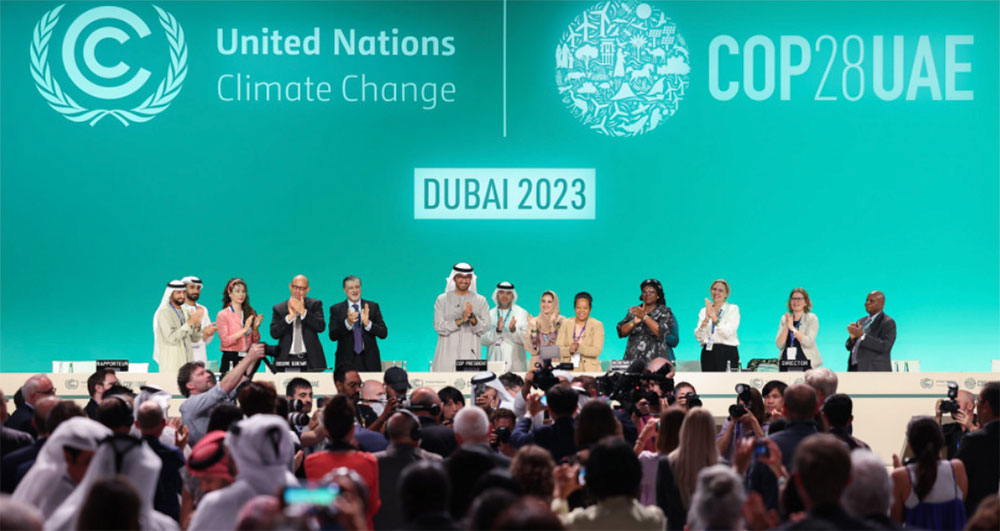YK Poudel
The newly released draft text on the Global Goal on Adaptation (GGA) released yesterday at the UN Climate Change Conference (COP28) in Dubai came out with an agreement on transitioning away from fossil fuels.
The UNFCCC (COP28), which concluded yesterday focuses on laying the ground for a swift, just and equitable transition, underpinned by deep emissions cuts and scaled-up finance.
The agreement lists seven targets, including significantly reducing climate-induced water scarcity, for implementation by and beyond 2030.
According to a press release from UNFCCC, negotiators from nearly 200 parties came together in Dubai with a decision on the world’s first ‘global stocktake’ to ratchet up climate action before the end of the decade—with the overarching aim to keep the global temperature limit of 1.5°C within reach.
UN Climate Change Executive Secretary, Simon Stiell in his closing remarks said that governments and businesses need to turn these pledges into real-economy outcomes, without delay. “Whilst we didn’t turn the page on the fossil fuel era in Dubai, this outcome is the beginning of the end,” he said.
The global stocktake is considered the central outcome of COP28. It contains every element that was under negotiation and can now be used by countries to develop stronger climate action plans due by 2025—recognizing the science that indicates global greenhouse gas emissions need to be cut 43 percent by 2030.
The stocktake calls on parties to take action towards achieving, at a global scale, a tripling of renewable energy capacity and doubling energy efficiency improvements by 2030.
The list also includes accelerating efforts towards the phase-down of unabated coal power, phasing out inefficient fossil fuel subsidies, and other measures that drive the transition away from fossil fuels in energy systems, in a just, orderly and equitable manner, with developed countries continuing to take the lead.
By 2025, the short-term goal is to bring parties with ambitious, economy-wide emission reduction targets, covering all greenhouse gases, sectors and categories and aligned with the 1.5°C limit in their next round of climate action plans.
Earlier last week, parties reached an agreement on the operationalization of the loss and damage fund and funding arrangements—for the first time a substantive decision was adopted on the first day of the conference.
The GGA framework reflects a global consensus on adaptation targets and the need for finance, technology and capacity-building support to achieve them.
Increasing climate finance
The Green Climate Fund (GCF) received a boost to its second replenishment with six countries pledging new funding at COP28 with total pledges now standing at a record USD 12.8 billion from 31 countries, with further contributions expected.
Bhutan has also launched the GCF last week.
The Least Developed Countries Fund and Special Climate Change Fund amounting to more than USD 174 million to date was committed by eight donor governments. However, experts have stated that these funds are not adequate.
Inclusive participation
Government agencies, civil society, indigenous people, youth, and international associations called for a way to empower all stakeholders to engage in climate action; in particular through the action plan on Action for Climate Empowerment and the Gender Action Plan.
The final versions of the reporting tools will be made available to all parties by June 2024.
As COP28 closed, parties agreed to Azerbaijan as the host of COP29 between November 11 and 22 November, 2024, and Brazil as the COP30 host from November 10 to 21, 2025.
At COP29, governments must establish a new climate finance goal, reflecting the scale and urgency of the climate challenge. Similarly, at COP30, the parties are to come prepared with new nationally determined contributions that are economy-wide, cover all greenhouse gases and are fully aligned with the 1.5°C temperature limit.
According to Simon Stiell, countries must deliver new nationally determined contributions in 2025. “Every single commitment—on finance, adaptation, and mitigation must bring us in line with a 1.5-degree world.”


